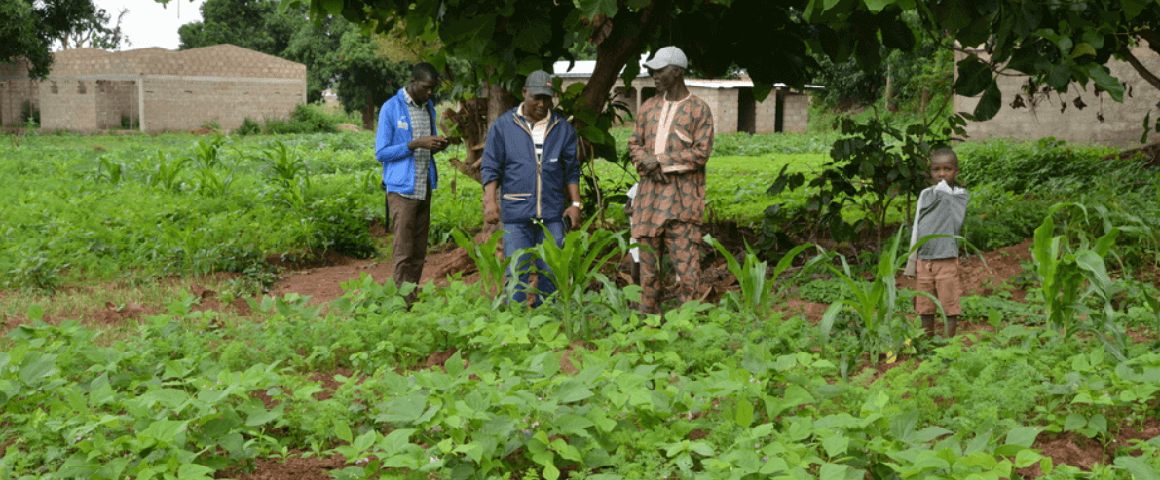- Home
- Worldwide
- CIRAD worldwide
- Projects
- MARIGO project
Development of agroecological market gardening encouraging the pooling of resources between territorial actors: Peri urban agroecological market gardening - MARIGO

The MARIGO project concerns the agroecological transition of market gardening practices in peri-urban zones. Here, in Korogho (Ivory Coast), one of the four project sites © Cirad
Issues
The vegetables most consumed in urban areas in Ivory Coast are onions, African aubergines, okra, tomatoes, chillies, spring onions, cabbages and leafy vegetables. Domestic market garden output amounted to around 700,000 t in 2013 with 161,000 ha of rainfed and irrigated crops. Today, that vegetable production would appear to be barely higher than the figure recorded for the period 1995-2000, which stood at 800,000 t. It is insufficient to meet the requirements of a rapidly growing (2.6% in 2014) and urbanized population. Consequently, the country continues to import vegetables regularly. In terms of quality, the availability of diversified and healthy products is also a major issue from the perspective of food security and the changing habits of urban consumers. One of the goals of the MARIGO project is to contribute to this diversification by promoting local vegetables known for their rich nutritional properties, produced in cropping systems adapted to agroecological niches and meeting the expectations of local stakeholders.
Description
The activities of the MARIGO project are:
- Establishment of a multi-stakeholder platform (farmers, private partners, public authorities, civil society and consumers) to share information, identify innovative solutions based on pooling resources and seeking a consensus for their implementation;
- Co-designing of agroecological and resilient market garden production systems by pooling the knowledge gained from previous projects, multidisciplinary knowledge (plant and soil health, post-harvest quality) and innovations resulting from the project;
- Support for actors involved in the agroecological transition of market garden production systems through training and demonstration activities in schools, vocational training centres and on pilot farms;
- Strengthening of agroecological market garden production systems through advocacy with public decision-makers, communication with actors in civil society and the development of academic training modules;
- Assessment of the environmental impacts of these new farming practices by monitoring soil and plant health indicators and product quality;
- Drafting of a quality charter with a view to national organic labelling of local products and farmer networks.
Expected changes
The main outcomes and deliverables of the MARIGO project are:
- A sustainable multi-stakeholder platform on agroecological market gardening will be available;
- Twelve leading market gardeners at each of the four study sites will be trained in agroecology, eight young researchers (theses) and twelve engineers (end-of-study traineeships) will also be trained in agroecology tools and techniques;
- A network of labelled farmers committed to respecting a local charter of good agroecological or even organic practices will be set up, as well as a national committee representing the stakeholders in the market gardening sector, in order to define, award and ensure compliance with an Ivorian organic label;
- Pilot post-harvest conservation equipment will be developed, audio/video clips, user manuals and guides to good agroecological practices will be produced and made available to stakeholders;
- Academic and vocational training modules will be designed for universities, schools and agricultural training centres;
- A varietal catalogue of local market garden species adapted to the environmental conditions in Ivory Coast will be produced;
- Multidisciplinary knowledge on plant health, soil health, post-harvest technology, life cycle analysis and socio-economics of market garden production systems will be produced.
The objective of the DeSIRA initiative (Development Smart Innovation through Research in Agriculture, is to contribute to climate-relevant, productive and sustainable transformation of agriculture and food systems in low and middle-income countries.
Learn more
























